The Eternal Table
Big City Food Biographies Series
Series Editor
Ken Albala, University of the Pacific,
Food helps define the cultural identity of cities in much the same way as the distinctive architecture and famous personalities. Great cities have one-of-a-kind food cultures, offering the essence of the multitudes who have immigrated there and shaped foodways through time. The Big City Food Biographies series focuses on those metropolises celebrated as culinary destinations, with their iconic dishes, ethnic neighborhoods, markets, restaurants, and chefs. Guidebooks to cities abound, but these are real biographies that will satisfy readers desire to know the full food culture of a city. Each narrative volume, devoted to a different city, explains the history, the natural resources, and the people that make that citys food culture unique. Each biography also looks at the markets, historic restaurants, signature dishes, and great cookbooks that are part of the citys gastronomic makeup.
Books in the Series
New Orleans: A Food Biography , by Elizabeth M. Williams
San Francisco: A Food Biography , by Erica J. Peters
New York City: A Food Biography , by Andrew F. Smith
Portland: A Food Biography , by Heather Arndt Anderson
Chicago: A Food Biography , by Daniel R. Block and Howard B. Rosing
Kansas City: A Food Biography , by Andrea L. Broomfield
Rio De Janeiro: A Food Biography , by Marcia Zoladz
Madrid: A Culinary History , by Maria Paz Moreno
The Food and Drink of Sydney: A History , by Heather Hunwick
A History of the Food of Paris: From Roast Mammoth to Steak Frites , by Jim Chevallier
The Food and Drink of Seattle: From Wild Salmon to Craft Beer , by Judith Dern, with Deborah Ashin
Taipei: A Food Biography , by Steven Crook and Katy Hui-wen Hung
Miami: A Food Biography , by Kimberly Wilmot Voss
A Taste of Naples: Neapolitan Culture, Cuisine, and Cooking , by Marlena Spieler
The Eternal Table: A Cultural History of Food in Rome , by Karima Moyer-Nocchi
The Eternal Table
A Cultural History of Food in Rome
Karima Moyer-Nocchi
with Giancarlo Rolandi
Rowman & Littlefield
Lanham Boulder New York London
Published by Rowman & Littlefield
An imprint of The Rowman & Littlefield Publishing Group, Inc.
4501 Forbes Boulevard, Suite 200, Lanham, Maryland 20706
www.rowman.com
6 Tinworth Street, London SE11 5AL, United Kingdom
Copyright 2019 by The Rowman & Littlefield Publishing Group, Inc.
All rights reserved . No part of this book may be reproduced in any form or by any electronic or mechanical means, including information storage and retrieval systems, without written permission from the publisher, except by a reviewer who may quote passages in a review.
British Library Cataloguing in Publication Information Available
Library of Congress Cataloging-in-Publication Data
Names: Moyer-Nocchi, Karima, author. | Rolandi, Giancarlo, author.
Title: The eternal table : a cultural history of food in Rome / Karima Moyer-Nocchi with Giancarlo Rolandi.
Description: Lanham, Maryland : Rowman & Littlefield, 2018. | Series: Big city food biographies series | Includes bibliographical references and index.
Identifiers: LCCN 2018031037 (print) | LCCN 2018052953 (ebook) | ISBN 9781442269750 (Electronic) | ISBN 9781442269743 (cloth : alk. paper)
Subjects: LCSH: Food habitsItalyRomeHistory. | FoodItalyRomeHistory. | Rome (Italy) Social life and customs. | Rome (Italy) Civilization.
Classification: LCC GT2853.I8 (ebook) | LCC GT2853.I8 M69 2018 (print) | DDC 394.1/20945632dc23
LC record available at https://lccn.loc.gov/2018031037
 The paper used in this publication meets the minimum requirements of American National Standard for Information SciencesPermanence of Paper for Printed Library Materials, ANSI/NISO Z39.48-1992.
The paper used in this publication meets the minimum requirements of American National Standard for Information SciencesPermanence of Paper for Printed Library Materials, ANSI/NISO Z39.48-1992.
Printed in the United States of America
To my beloved,
Tua

Acknowledgments
My sincerest thanks go out to Adrian Bregazzi and Andrew McGowan for their generous assistance as readers, consultants, and editors. Thanks also go to Simone and Venanzio Nocchi for research assistance, Yhara Formisano and Francesca Fabri for their on-call support, Sheena Vick my test reader, and Elizabeth Yorke, who helped compile the index.
I thank Mina Novelli, Alberto Manodori Segredo, Walter Levy, and Salumificio Porchetta Leopardi Srl for their kindness in allowing me to use images from their personal collections, and Katie Parla for her recipe contributions. Thanks to Gabriele Gatti and Elisabetta di Benedetto, whose kind hospitality in their San Lorenzo flat gave me one less worry.
Karima Moyer-Nocchi
July 2018

Ostium
I shall, at all events, derive no small satisfaction from the reflection that my best endeavors have been exerted in transmitting to posterity the achievements of the greatest people in the world.
Titus Livius, The History of Rome
Writing about Rome is nothing less than a privilege. There is arguably no other city whose history and culture have been so thoroughly researched and written about in such minute detail as Rome. And yet, as its byname promises, the Eternal City is a source of seemingly endless curiosities waiting to be explored and interpreted. I was therefore fortunate to have found a niche that has afforded me the honor of writing the first concise cultural history of the food of the Eternal City from pre-Roman to modern times.
While there are commendable cookery books with well-written overviews of Roman food history, and studies that go into depth about particular periods, the aim here is to examine the role that food played in and alongside the development of a city and its people, how it was utilized culturally and politically, and how that led to the individuation of a gastronomy with a uniquely Roman stamp. Such a project involved the daunting task of assembling a succinct narrative outline that captured the underlying momentum, both in terms of continuities and departures. The process of creating a cohesive, illustrative framework spanning such a long and complex time period necessitated bypassing some key points and reducing others to a bare synthesis or risking oversimplification. Often histories of food become elaborate historical grocery lists, overlooking the social contours. Food history is not, however, a list of plants, animals, or dishes, but a narrativethe story of production, distribution, accessibility, demand, and control. It is about the human partnership with what is raised, picked, fished, caught, slaughtered, and cooked. It is about the meaning, expression, and manifestation of eating and feeding as it is experienced and perceived along the continuum between excess and dearth.
The cultural history of food in Rome is, like the city itself, made up of multiple layers running both vertically and horizontally. It is therefore treated here both thematically and chronologically, often necessitating a two-steps-forward-one-step-back approach, underscoring connections as they evolve through time and topic.
Numerous scholars, and many others, have made the study of Rome their lifes work. Both my own ideas in this book, and those of other authors whose work I have relied upon, may thus run counter to positions put forth by others. As aptly put in Horden and Purcells The Corrupting Sea , To borrow an evocative term from mathematics, the Mediterranean is a fuzzy set. Rome, as a focal point in the Mediterranean, as well as the subject of so many books, films, television series, and vacation packages, makes it prey to sentiment and idealization, from idyllic pastoralism to imperialistic grandeur. Such emotional investments may stir resistance from those enamored of the patina that shrouds the reality. We live in a time favoring journalism that gushes about the Mediterranean, a parti-pris , that is not employed in this culinary retrospect.
Next page
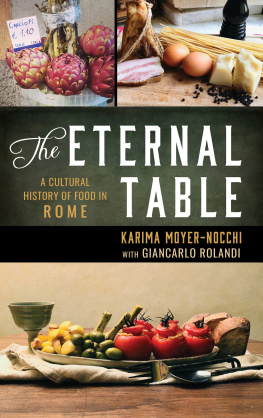
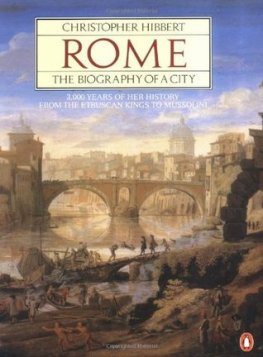
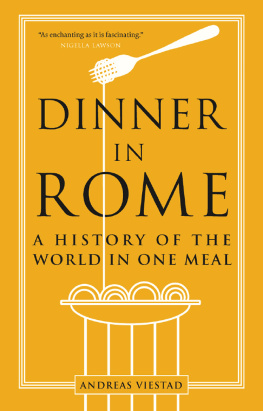
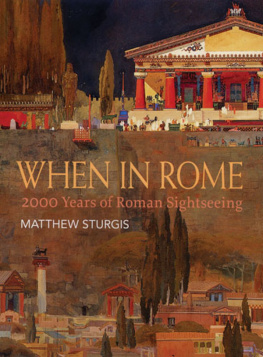
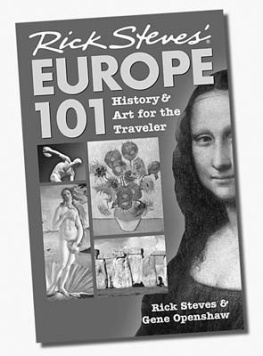
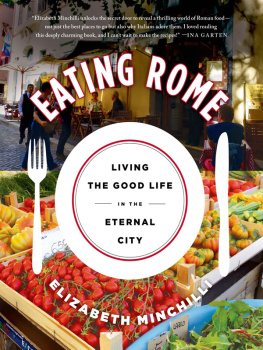

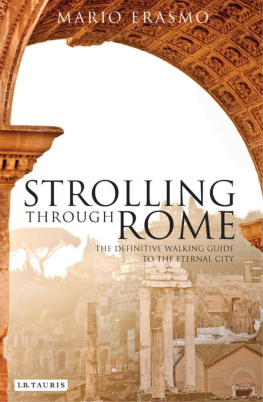
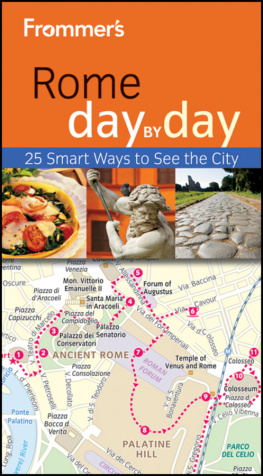
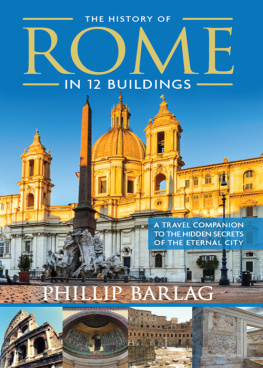
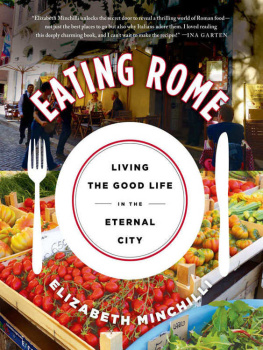
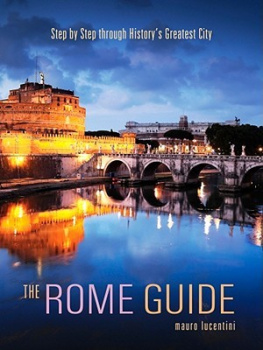
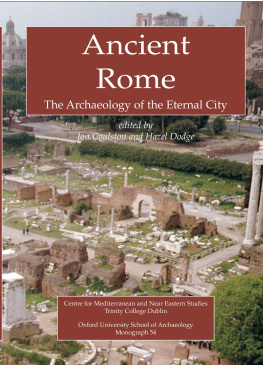
 The paper used in this publication meets the minimum requirements of American National Standard for Information SciencesPermanence of Paper for Printed Library Materials, ANSI/NISO Z39.48-1992.
The paper used in this publication meets the minimum requirements of American National Standard for Information SciencesPermanence of Paper for Printed Library Materials, ANSI/NISO Z39.48-1992.